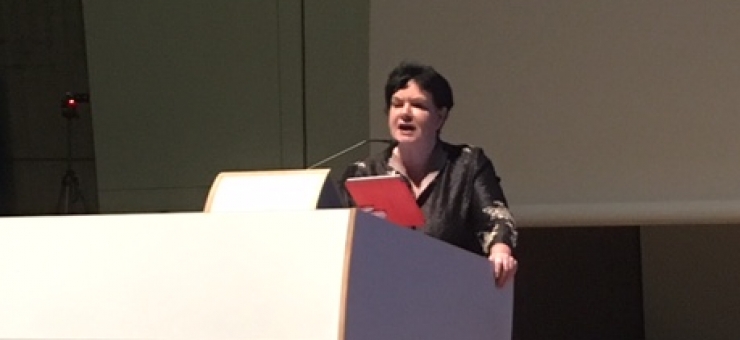The Peace Imperative - Investment and Inclusion

The International Trade Union Confederation General Secretary, Sharan Burrow, told more than a 1000 activists gathered at the International Peace Bureau World Congress in Berlin, that the trade unionists around the world stood shoulder to shoulder with them and shared their values.
UNI Global Union General Secretary, Philip Jennings leads a strong UNI delegation at the Congress, including a number of members of UNI Youth. The theme of the Congress is ‘Disarm! For a Climate of Peace.’ During his keynote speech closing the final plenary session on Sunday, Jennings will urge that the creation of a roadmap for a just transition to peace becomes a reality.
In her speech at the opening Burrow made it only too clear that such an initiative was urgently needed: “We must act to strengthen the call for peace and disarmament all over the world. We stand with you to disrupt the arms trade, to work to bring an end to conflict and to fight for the peace imperative with vital investment and inclusion of the world’s people. Together we can rebuild and realise the dream of peace.”
The ITUC leader said the challenge to create this peaceful new world was great and that we were facing grave wars and conflicts across the globe. Burrow compared the progress made after the end of World War Two in 1945 including a marked fall in the global death rate with the current carnage in Syria and the UN Security Council’s impotence in the face of ISIS which is now taking root in Africa, a continent also facing intractable conflict in South Sudan, Nigeria, and Central African Republic.
Referring to the ongoing atrocities in Aleppo, Syria, Burrow put it succinctly, “Stop the bombs – there are children in the rubble who’s cries we cannot hear.”
“Democracy, human rights and freedom was the peace dividend from the ashes of Second World War but the dream of putting conflict to rest in a peaceful, prosperous, educated and tolerant world has been fractured,” warned Burrow.
She said that trade unions have shown that they can take a lead on the road to peace, the exemplary role of UGTT in Tunisia after the Arab Spring being one of the best examples.
Burrow explained, “The UGTT was central in mobilising and negotiating the democratic transition in Tunisia while avoiding the level of bloodshed in other countries during the “Arab Spring”. Unions mobilized the community groups that were behind the drafting of a Tunisian constitution which guarantees fundamental principles such as the separation of powers, an independent judiciary, freedom of association, the right to organise and the right to strike. And they were rewarded with the Nobel Peace Prize for the 'Dialogue Quartet’.”
Burrow also paid tribute to the unions in Colombia who have a played an important part in bringing about the peace agreement with FARC and the ‘White Helmets’ who stay in Syria, at their own tremendous risk, to rescue people and to help build communities.
Burrow said, “Disarmament is more important than ever. The massive trade in arms and the public dollars tied up in the trade is both a threat to peace and to investment in social protection or jobs elsewhere in the economy.
“Unions face the fall-out from political investment or divestment and changes in global demand and the impact on workers every day. The centrality of socialialogue and the consequent commitment to national and industry plans for managing these shifts is our key demand.
“Peace, secure democracy, prosperity - it all requires people to talk to each other; unions know that social dialogue and collective bargaining work. And last week the Prime Minister of Sweden launched with us the call for a new Global deal based on just that, social dialogue - people working together in peace and unity for the promise of the UN Sustainable Development Goals.”
Follow the International Peace Bureau World Congress on:
www.facebook.com/IPBcongress2016
www.twitter.com/IPBcongress2016
#IPBcongress2016

